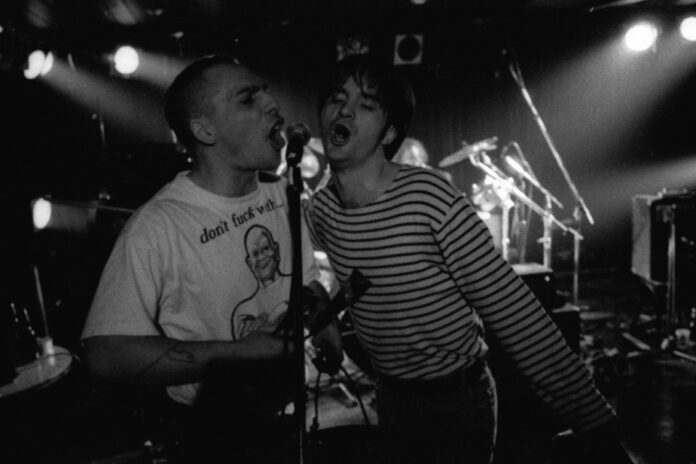Although it has been told extensively, the story of Roommates inspires a new documentary. But unlike the many books, shows, and other articles that have delved into the subject over the past two decades, this feature film doesn’t just shine the spotlight on André “Dédé” Fortin; he is also interested, in equal parts, in the second missing member of the group, the harmonicist Patrick Esposito di Napoli.
Aptly titled Dédé and Patrick: Beyond the Stars, the film chronicles the friendship between the two men. A friendship formed at the turn of the 1980s and 1990s, when we witnessed the emergence of Les Colocs, a flagship formation of the time.
In an interview, director Jean-François Poisson (Léo-Paul Dion: confession of a killer, The Order of the Solar Temple) insists: he wanted to retrace these two crossed destinies and above all, for André Fortin, “to focus on the human being behind the icon”.
Dédé and Patrick: Beyond the Stars is not the work of a roommates fanatic. Certainly, we hear some extracts from the great hits of the Quebec group, such as Julie, Passe-moé la puck, La rue principal and Bon yeu, but in general, we are shown the protagonists without their instruments.
“I worked at MusiquePlus, recalls Jean-François Poisson. I knew the basics of Colocs. But I was not a fan. It wasn’t my kind of music. I was more of a new wave type. When I started the project, I was completely detached. »
“The story of people interested me much more than their music,” continues the 42-year-old documentary filmmaker. It shows in my editing, I think. »
Produced by Attraction, Dédé and Patrick: Beyond the Stars lands this week on Vrai, Quebecor’s unscripted content platform. Lasting 90 minutes, the documentary emerges 12 months after Marie-Soleil and Jean-Claude: beyond the stars (2022), Jean-François Poisson’s previous offering which revisited, 25 years later, the tragic death of the couple formed by Marie-Soleil Tougas and Jean-Claude Lauzon.
With his new film, the director takes us back to the last century through twenty testimonials from relatives of Patrick Esposito di Napoli and André Fortin, including Jimmy Bourgoing, drummer of Les Colocs from 1990 to 1997, Marc Déry, Lise Raymond , the group’s press officer, and Mara Tremblay. In front of the lens, the singer opens up on several sensitive topics, including her secret and “extremely tortured” romantic relationship with Dédé Fortin.
“I was surprised to see how much people opened up, how much they forgot about the camera,” says Jean-François Poisson.
The feature film includes some emotional moments, especially when it comes to the deaths of Patrick and André (the first died of AIDS in 1994, the second committed suicide in 2000). We can see that even today, the wounds are raw for several stakeholders.
“It’s often like that,” observes Jean-François Poisson. It’s like therapy. They think they won’t have emotions, but no… They end up breaking down. The same thing happened with Micheline, the mother of Marie-Soleil [Tougas]. She said to me, “You know, I don’t cry.” But when you’ve been talking to someone for two, three hours, eye to eye, the emotions come back, like at the shrink. You start crying without ever realizing it. »
According to the director, he would never have succeeded in rallying so many friends, members and former collaborators of Colocs if he had decided to articulate his documentary around Dédé.
“It wouldn’t have interested many people, because they’ve already talked about it. When I told them I wanted to talk about Patrick, their eyes lit up. It opened many, many doors for me. »
An ex-roommate, however, refused to participate in the project. At the heart of an eternal conflict with Réal Fortin, Dédé’s brother, guitarist Mike Sawatzky demanded that his face be blurred on all archive images, reveals Jean-François Poisson.
Speaking of archive footage, the documentary contains several previously unseen footage, such as those of one of the first performances of the Sneakers, the pre-Colocs training, captured in 1985 in a field. We can also see some sequences shot at the famous 2116, this dilapidated building in Montreal, at the corner of Sherbrooke Street and Saint-Laurent Boulevard, where Dédé and company squatted before achieving success.
“Those were important years. A pivotal moment. A gang of carefree young people who partied together… We feel a great nostalgia when they evoke this period today, “comments Jean-François Poisson.
On the eve of the launch of Dédé and Patrick: Beyond the Stars, the director hopes it will appeal not only to the general public, but also to the witnesses of the time who indulge in it. A first test proved conclusive last July, when the trailer for the documentary was released on the internet. Trailer shared by Mara Tremblay, along with a message noting how “honored” she was to be part of it.
“It touched me a lot, admits the director. It reassured me, too. Because all these people trusted me. I had to ensure. »





